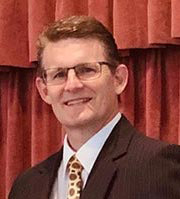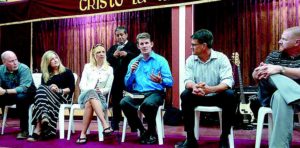New team leader for church revitalization says Tennessee has what it needs
By David Dawson
ddawson@tnbaptist.org
FRANKLIN — Kevin Minchey is a firm believer in Tennesseans helping Tennesseans.
Minchey plans to promote that philosophy in the months ahead as he begins his new role as team leader for church revitalization at the Tennessee Baptist Mission Board.
Minchey, who took over the new position on Jan. 1, said most of the resources — including manpower and materials — that many struggling churches need are available without having to leave the state’s borders.
“I think that we, as Tennesseans, understand our state better than anybody,” said Minchey. “And I think we have enough talented people — between authors, speakers, church leaders — to make it work. What I would like to do, as much as possible, is to have Tennessee Baptist pastors and leaders producing and/or providing the materials for churches who are looking to revitalize.”
“Everything we do,” he added, “I would like for it to be Tennessee-specific, first and foremost.”
Minchey, who has been with the TBMB revitalization team for three years in a part-time role, said he believes the motto for church revitalization should be “For Tennessee Baptists, by Tennessee Baptists.”
“What I will be looking to do is to try to find someone in Tennessee that can speak to whatever needs and revitalization that a specific church might have,” he said. “I want us to look at Tennessee Baptist pastors and directors of missions first before we say, ‘Well, there’s someone out there (who can help).’ ”
![]() Prior to moving into his new full-time role with the TBMB, Minchey served as the director of missions for Concord Baptist Association, based in Murfreesboro. He also previously served as pastor of First Baptist Church, Shelbyville, for nine years.
Prior to moving into his new full-time role with the TBMB, Minchey served as the director of missions for Concord Baptist Association, based in Murfreesboro. He also previously served as pastor of First Baptist Church, Shelbyville, for nine years.
In his new role, Minchey will coordinate church revitalization efforts throughout the state. Church revitalization is one of the Five Objectives of the Tennessee Baptist Convention adopted by messengers to the annual meeting in 2014. The goal in CR is to see 500 Tennessee churches revitalized by 2024.
Minchey said he has entered his new role at the TBMB with an open mind, knowing that there are rarely any “quick fixes” and there is not a “one-size-fits-all” solution. He said he wants to implement a system that helps each church on a case-by-case basis, even though some churches are struggling with similar issues.
“We’re starting with a clean slate,” he said. “And honestly, I am still in the process of envisioning what that’s going to look like. Having done this for three years part-time, mostly in middle Tennessee, we’ve seen a lot of the same patterns of behaviors, some of the same dysfunction, the same obstacles and barriers. We’re working to either create or find the best resources to come alongside people who are trying to overcome those barriers or untangle those knots that they have.”
The process of church revitalization can often be a sizable challenge, for both the church itself and for those who are trying to help. It can be emotionally draining.
However, the end result of the process — when it’s successful — is well worth the effort, and the long hours, that goes into it.
“When we see (the success stories), it’s wonderful,” said Minchey. “And we know that if we keep engaging churches, we’ll find the ones who want to go through the journey. I use the word enthusiasm a lot, and I encourage churches to be enthusiastic. The word enthusiasm means to be in God. When we abide in Christ, then enthusiasm permeates the church. Sometimes all a church needs is for someone to say, ‘Okay, God has not forgotten you. He knows where you are.’ ”
Minchey believes that outreach, especially in terms of sharing the gospel in our communities, needs to be a starting point for virtually all churches who are struggling.
“Revitalization, in some ways, is removing the reasons why these people elect not to come to your church,” he added.
Minchey said the process of church revitalization starts with an assessment, which is perhaps the most critical element of the plan. Identifying the needs, and expanding on the already-successful aspects of their ministry, is a pivotal part of the process.
“We’re going to look to see what they are doing well, what they are doing that might need some help, and then we’re going to ask: What could your church look like?” said Minchey.
Minchey said Tennessee Baptists generally can’t use the excuse of “we can’t find anyone to invite to church.” That is simply not true, he said.
“The good news is there are more people than all our churches can hold,” he said. “So, we want to help churches penetrate that population. In Tennessee, you’ve got to look hard for places that would get a pass on demographics in terms of not having anyone around.”
Churches don’t have to grow in leaps and bounds in order to be effective, Minchey said. The growth process can come in small increments, and then build from there.
“If a church of 30 can become a church of 50, then you now have what a lot of people consider to be the critical mass to become a church of a 100,” he said.
In keeping with his Tennessee-first mindset, Minchey believes the assessment process can be completed without “outside help.” The Cooperative Program helps makes this possible, he said.
“It’s another one of those things that I’d like for it to be in-house as much as possible,” he said, “as opposed to paying someone from somewhere else to do it. I think we know best what to look for when we are assessing churches. Then, based on that, I would like to go back again to some of our key leaders — with specific expertise — to help those churches.”
Minchey said the heart and soul of Tennessee Baptists can be found in the smaller churches across the state. Those are the churches, he said, that so many families want to belong to and want to participate in. Helping those churches find their footing, and be effective in their communities, is the ultimate goal.
“It is not the superstar pastors in the mega churches because we didn’t have many of those,” Minchey said. “It is more about what I call the ‘block and tackle’ churches. If we can provide some modules for them — be it outreach, engaging the community, multiplying disciples, preaching, planning, worship services, those types of things — then we will be able to truly help them fulfill their purpose as a church.” B&R


